Just Starting Baby-Led Weaning? Ask Me Anything...
- How much gagging is normal? My 7 MO seems to be hating BLW because he is gagging a lot.
- If baby refuses a food, should we get something different out or accept & try again next meal?
- How many times a day should I offer BLW to my 6-7m old? How many meals should they have a day until 1 year?
- How should I wean my baby from the bottle? What should timeline be?
- What should I tell my family when they say “but you turned out fine”?
- Do you offer water with every meal? How much?
- How can I incorporate Indian vegetable dishes with spices while trying to raise vegetarian baby?
- How do I know if my 6m old ready to start BLW?
- What cheese can 8-month-old baby have?
- I'm interested in BLW, but my baby is in daycare 3X a week. Do you recommend doing purees there?
- How do I deal with my baby's extreme constipation and pain?
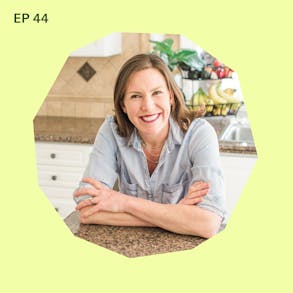
LISTEN TO THIS EPISODE
Episode Description
Are you just starting out with baby-led weaning and FULL of questions about whether your baby can safely self-feed? Well then, this is the episode for you! I’m going to rapid fire answering your questions about getting a SAFE start to baby-led weaning.
In this Ask Me Anything episode I’m covering the topics of readiness to feed, gagging, food refusal, scheduling, weaning from the bottle, dealing with doubters and family members who say, “you were spoon fed and you turned out fine!!”. Also diving into what your baby should drink, flavoring your baby’s food without salt and sugar, daycare, constipation and CHEESE!!

Other Episodes Related to this Topic
- Episode 55 - How to Drop a Milk Feed
- Episode 58 - What do I do if My Baby Has an Allergic Reaction? with Ron Sunog, MD
- Episode 368 - Using a Milk Ladder for Babies with Dairy Allergy with Carina Venter, PhD, RD
- Episode 227 - When Does the Food Allergy Prevention Window Close? with @allergykidsdoc David Stukus, MD
Links from this Episode
- Use KATIE10 for $10 off on all Online CPR Training Courses
- Today’s podcast is brought to you by Baby Quip, the #1 baby equipment rental service delivering clean, safe & insured rented baby gear RIGHT to your door. They’re now available in more than 500 cities in the US & Canada & you can check them out at babyquip.com
- Baby-Led Weaning with Katie Ferraro program with the 100 First Foods™ Daily Meal Plan, join here: https://babyledweaning.co/program
- Baby-Led Weaning for Beginners free online workshop with 100 First Foods™ list to all attendees, register here: https://babyledweaning.co/baby-led-weaning-for-beginners

Latest Episodes
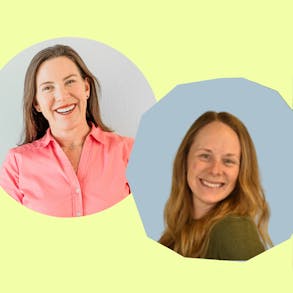
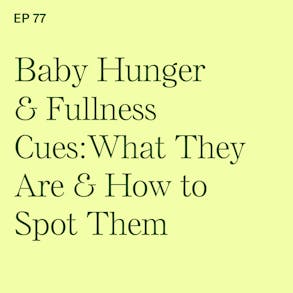
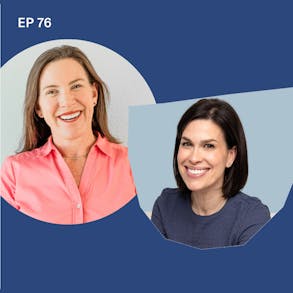
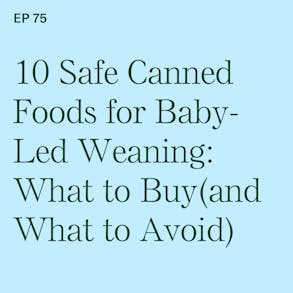
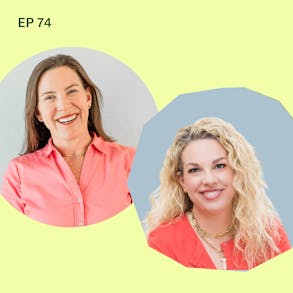
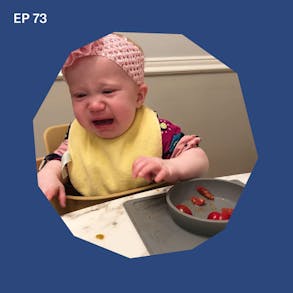
Skylight Frames (0s):
I will be the first to admit that I was definitely late to the shared Family calendar game for years. I would just keep stuff on the calendar in my phone or the sticky notes or my brain. My husband was on a need to know basis. Then I would get frustrated with him when he couldn't read my mind about all the stuff we needed to work on together to get seven kids. So there are sports and their activities and just get through the day. That all changed when I got a Skylight calendar earlier this year for Mother's Day. So I'd heard of the skylight, but at first I was like, oh, that's not for me. Like we're not a big technology family. My kids do not have tablets or watches. They do not have any way to check the calendar. Then I started realizing How much they were asking me if they could see my phone. Can I see your phone? I wanna see what time my soccer practice is. I have one son, can I see your phone? I need to see what time the Padres play every day when we got the skylight calendar, you guys, total game changer. It's this beautiful 15 inch display. I put it right on the counter in the kitchen so it's right at the kids' eye level. They can reach it. I put the family calendar that was previously only on my phone on the skylight. I color coded every kid. I even sat down recently and manually inputted our paper chore chart. So now every kid checks their chores for the day. They do it, they check it off. They get a star for every tour they do. After a certain number of stars, I've got like a whole reward system set up. The skylight calendar is amazing. It's wifi connected. It syncs seamlessly with your calendar. There are tons of customizable views for daily, weekly, or monthly planning. You can even put in meals, which I recently started doing, So that A, I would actually stay like on a meal plan during the summer when we're kind of off of our schedule. And B, everybody would stop asking me what's for dinner. Right now Skylight is offering our listeners $30 off their 15 inch calendar if you wanna check it out and organize your family life for yourself. I swear this will change your life too if you go to skylightcal.com/weaning. So again, go to skylightcal.com/weaning to get $30 off your 15 inch calendar. That's S-K-Y-L-I-G-H-T-C-A-L.com/weaning and get your calendar game on point now because I know that your brain is also approaching max capacity with that baby. And skylights calendar is pure heaven for connecting your digital and your non-digital world together.
Katie Ferraro (2m 13s):
And I know the thought of your baby gagging on food just immediately induces anxiety, especially if you're just starting solid foods. But it's important to keep in mind that gagging is actually a good thing. So gagging is a natural and necessary part of learning how to eat. Now let's compare that to choking, which of course is not a good thing. It is a life threatening situation that does require your intervention. But as long as you know the very simple difference between gagging and choking, you'll know when you should intervene. But more often than not when you should not intervene 'cause we don't intervene during a gag. And here's why. Hey there. I'm Katie Ferraro, registered dietitian, college nutrition professor and mom of seven specializing in baby-led weaning here on the Baby-Led Weaning with Katie Ferraro podcast.
Katie Ferraro (2m 56s):
I help you strip out all of the noise and nonsense about feeding, giving you the confidence and knowledge you need to give your baby a safe start to solid foods using baby-led weaning. Hello and welcome back to the baby-led weaning podcast. Very excited about today's episode, don't it Ask Me Anything. If you are just starting baby-led weaning, what sort of questions do you have? Lay 'em on me. I put out a call on my Instagram channel saying, Hey, I'm doing a podcast episode. Ask Me Anything. What are the questions that you have? I got a ton of responses all over the board. So we're gonna cover things from allergenic foods to fear about gagging and choking.
Katie Ferraro (3m 40s):
How do you make the foods safely? How do you know if your baby's really ready to start? I had one mom that said, I don't even know where to start. I got you covered in today's episode. Just Starting Baby-Led Weaning. Go ahead and Ask Me Anything. If you are on Instagram, I'm there too at babyledweanteam. I have got at this point, like nine years worth of content on there. I love it when I get messages from parents that are like, hi, I just found your page and I just spent like four hours on your page. That Instagram, by the way, does not give you those level metrics, but it's nice to hear that there are parents finding this as a wonderful free resource as a, you know, this podcast is too, I, for one am trying to spend way less time actually looking at my phone and consuming visual content 'cause it makes my brain explode.
Katie Ferraro (4m 24s):
But I still love a podcast and that's why I'm here on the podcast every week. Also, two new episodes a week. I do a mini solo training episode every Monday and then every Thursday I generally do a longer interview style episode with another feeding expert. And if your ears are exploding with info and you do like to watch video, I also have a YouTube channel. It's just youtube.com/babyledweaning and lots of videos for you there On Safe Food Prep, I do highchair reviews. I show you all the ins and outs of safe highchair positioning and safe food prep. Basically everything you need to know to keep your baby safe when you're starting solid food. So I'm gonna go through a random grab bag of questions that I got. These are in no particular order.
Katie Ferraro (5m 5s):
I'm just dumping 'em in in the order that they came through to me. First question for the baby-led weaning, Ask Me Anything. What are affordable ways to introduce shellfish? All right, little context here. Shellfish is one of the top nine allergenic foods. Those are the nine foods that account for about 90% of food allergy. I just got done on the podcast doing a whole series one individual episode on each allergenic food. So if you go to BW podcast.com, you can see all of the episodes. We have 500 episodes to this podcast. I cover every allergenic food there, but I'll just like TLDR it for you with the shellfish. Shellfish is different than finfish. Okay? There's crustaceans, there's mollusks, shellfish allergy. I'll also link to the whole shellfish allergy episode if you wanna hear that.
Katie Ferraro (5m 48s):
But sometimes parents are like, I'm not gonna do crab, or I don't wanna do lobster. Now, we do have a lot of families that do do lobster, which is a type of shellfish as a way to celebrate their baby's 100 First Food celebration. So there's 100 Foods on my 100 First Foods list. There's 20 different allergenic foods in the allergenic food category. They're all variations of those top nine allergenic foods. And some families will save lobster till the end. A lobster is not cheap. But this question is, what are some affordable ways to introduce shellfish? So here are a few of my favorite. I love canned crab, okay? Making little baby-led weaning crab cakes. So instead of using regular crab, which is really expensive, you can find canned crab, which is still pricey her, but not as pricey as fresh crab in most places.
Katie Ferraro (6m 31s):
It's also available everywhere, which is nice. And I don't want you to shy away from canned foods, okay? Because if you read the ingredient list and it just says crab with no added salt, it's perfectly fine for your baby to eat. I also wanna point out that a lot of the canned shellfish that you might find as well as fish, you're gonna see higher levels of sodium than you would anticipate, and you'll be like, well, I don't wanna feed this to my baby. But keep in mind that shellfish and fish, those foods are high in minerals and seafood has a lot of minerals, and one of those minerals is salt. So sometimes some of that salt that you're seeing is naturally occurring. So we wanna get that protein, the shellfish protein into your baby, and it might come alongside a little bit more salt than you're used to, but you know, in moderation, it's not really that big of a deal.
Katie Ferraro (7m 12s):
I love to do crab cakes and instead of making them with regular breadcrumbs, try out Panko breadcrumbs. They're the Japanese style breadcrumbs. They tend to be lower in sodium. I mix it with some egg. If you're sure your baby's already passed, egg and wheat, not allergic to those foods, just make up a little crab cake. I've got tons of recipes, actually over 300 recipes for baby-led weaning inside of My program, Baby-Led Weaning with Katie Ferraro. You can check that out at babyledweaning.co/program. We've got a lot of other shellfish recipes in there too, if you're into shrimp, okay? We don't just give rubbery pieces of shrimp to an early eater. No way. Huge choking hazard. But there's very easy ways to dice up shrimp, incorporate it into fritters, into patties. You can make shrimp cakes just like the crab cakes that you would, and then cut those into little finger foods that your baby can pick up and feed to themselves.
Katie Ferraro (7m 56s):
I generally don't do canned shrimp. It's like almost impossible to find canned shrimp that doesn't have added sodium, but you can find canned crab that doesn't have added sodium. So check those out for affordable ways to offer shellfish. All right, next question. We have introduced lamb and chicken. What are some other easy meats? If you have my 100 First Foods list, okay, there's 100 Foods on that list. There's 20 foods divided into five categories. So following my five step feeding framework, we're offering your baby five new foods a week. So we do a new fruit on Monday, a new vegetable on Tuesday, a new starchy food on Wednesday, a protein food on Thursday, and an allergenic food on Friday. So if you go to that fourth category, the proteins, there's 20 protein foods on there, 10 of them are plant proteins and 10 of them are animal proteins.
Katie Ferraro (8m 42s):
So you'll find beef, you'll find liver, you'll find chicken, you'll find duck. We're talking about meats here. These are the animal based proteins. We have ground meat on there, we have lamb, we've got pork. If your family eats that, we've got rib meat. I show you lots of different ways to make ribs safe. We've got Turkey. There's no shortage of animal protein foods, but how you make them safe is really what matters. So if you need to grab a copy of that 100 First Foods list and you don't have it yet, that's what I give away to for free to everybody on my free online workshop called Baby-Led Weaning For Beginners. If you go to babyledweaning.co/workshop, you can sign up for the workshop, take it right now, later today when your baby naps tomorrow, whatever's convenient for you.
Katie Ferraro (9m 24s):
And at the end of that, I show you how to download the 100 First Foods list, put it on your fridge and start knocking off those protein foods. And we do a new protein food every Thursday. If you're following my 100 First Foods Daily Meal Plan, the fourth day of every week we're doing a new protein. We alternate both plant and animal proteins. Hey, we're gonna take a quick break, but I'll be right back.
KiwiCo (9m 49s):
How are you doing with your summer stress level? I know my kids are out of school, and while I love these longer days with less structure, they are long days with less structure. Thankfully, this year I've come prepared with my summer sidekick Kiwico. Kiwico develops hands-on projects and activities for kids of all ages, and they are my summer savior with the Kiwico Summer Adventure Series. With the Summer Adventure Series, Kiwico delivers awesome science and art projects where kids receive six hands-on project kits over six weeks with enriching content and fun activities to accompany each project. So you can stop that summer slide before it even starts with engaging projects like the archery set where kids build their own bow, helping to turn the outdoors into a playground of learning and fun. I know how hard it really can be to keep your kiddos engaged and busy and challenged during these lazy days of summer. And for sure, yes, we should be relaxing. But if you are down for a little summer structure with projects that you'll enjoy working on as much as your kids do, go check out Kiwico. You can get started building the best summer ever with KiwiCo and get $15 off your summer adventure series at Kiwico.com/weaning. That's $15 off your summer adventure kit at Kiwico.com/weaning.
Katie Ferraro (11m 19s):
Next question, 12 months, 10 month adjusted. I'm in EP, so exclusive pumper, and my baby is starting to drink way less milk. Is that normal for the baby's age? So I was an exclusive pumper for all of my kids. So I had a singleton who was terrible at breastfeeding because she had a perfect latch but no transfer. So pump for her. Then I had quadruples, barely even tried to latch them. I was so overwhelmed, but pumped my buns off to get enough breast milk for them. And then I had a set of twins. I had seven kids, three and under. I was literally attached to my breast pump for more than three years. I have so much respect for those moms who are out there pumping like crazy to provide for their babies. So congratulations to you. But I also wanna point out that if you have a 12 month old who's 10 months adjusted age, so this is a mom who clearly had a baby born about two months or maybe eight weeks-ish premature.
Katie Ferraro (12m 8s):
So you wait to start solid foods until your baby's six month adjusted age. So even though her baby is 12 months, she probably didn't start until the six month adjusted age, which was only four months ago. But once your baby's been eating for four months, right? That's, you're probably at 80 foods by now, right? Because we do five new foods a week. That's 20 foods a month, okay? In five short months, your baby's eating 100 Foods. Of course, when you get down the weaning road, like once your baby's been eating foods generally for about eight weeks, the first eight weeks are a little rocky. But after the eight week mark is when you kind of enter that magical phase two of baby-led weaning, it's like the second trimester of pregnancy when you're like, oh my gosh, I actually look pregnant and starting to not feel so terrible like the beginning of pregnancy.
Katie Ferraro (12m 49s):
You all know how that went. The beginning of baby-led weaning phase one, those first eight weeks are really brutal. Your baby doesn't eat a lot. You're like, why am I even doing this? It's a ton of work. It's wasting a ton of time. My baby's hardly eating anything. Stick with it. Do that one nude food every day, because once you get to food 40 and you cross over into phase two, which is the second eight weeks of baby-led weaning, that's when everything starts to click. And that's what this mom is experiencing right now because her baby is starting to drink less milk, and that is to be expected, right? That is weaning in action. Your baby is starting to get more nutrition from food and less nutrition from milk. So yes, that's very typical for your baby's age and their stage. If you are interested in How to Drop a Milk Feed, I do have a podcast all about that.
Katie Ferraro (13m 33s):
We teach a lot about that inside of the program too, because dropping a milk feed and knowing what feeding schedule that it's time to move to is so important to help your baby move along that continuum So that when you get to one year of age, most of your baby's nutrition can be coming from solid food and you're gonna be offering a lot less infant milk. So if you'd like to learn How to Drop a Milk Feed, go check out episode 55. It's called How to Drop a Milk Feed, and you can find that at blwpodcast.com/55. All right, next question, what reactions do I look out for with allergens and what do you do if I see any allergen?
Katie Ferraro (14m 13s):
So that's a great question. Your baby's allergic reaction to food will almost always have some sort of skin involvement. So usually it's gonna be hives which are raised red, itchy patches, and those are generally going to be accompanied by another sign of allergic reaction. So it's not just like hives, like babies get hives and red stuff on their face or skin all the time if it goes away on its own, not really a cause for concern. But if your baby has hives and another sign of allergic reaction, then yeah, we're thinking, Ooh, maybe the baby has a food allergy to this particular new food protein that you've introduced. So what are the other signs of allergic reaction? We're talking about things like difficulty or labored breathing, swelling, uncharacteristic, bossiness, vomiting. Basically it's hives, so skin plus another sign of allergic reaction.
Katie Ferraro (14m 57s):
And those two things together after your baby has tried a new food, and just as an aside, your baby is unlikely to have an allergic reaction the first time they try the food. It'll be on the second or the subsequent time. That's why we want to do repeated introduction of that allergenic food. In my program, we offer the new allergenic food every Friday in our menu and meal plans. We do that new allergenic food twice on Friday, twice on Saturday and twice on Sunday for continued exposure across the weekend. No other new foods across the weekend, but yes, do continue to offer your baby other familiar non-allergenic foods in addition to that allergenic food. And when it comes to if your baby has an allergic reaction, what do you do? I've got a wonderful podcast episode with one of my favorite people in the infant feeding space.
Katie Ferraro (15m 40s):
His name is Dr. Ron og. He is a pediatrician and he did an entire beautiful training back in episode 58, which is called What do I Do if My Baby Has an Allergic Reaction? And again, that's with Dr. Ron og. It'll teach you all about what to do if that does become a reality for your baby. But I want you to know that the vast majority of babies will not be allergic to foods and will not have an allergic reaction. However, the only way to know if your baby is allergic to a food is to actually offer them that food. So keep on doing those top nine allergenic foods. If you're following along in the 100 First Foods Daily Meal Plan in the program, we are gonna be done with all the allergenic foods by week nine of that program.
Katie Ferraro (16m 23s):
So even before you get to food 50, your baby's already tried all of those allergenic foods, and most parents are like, whew, I feel so much better knowing that my baby is not allergic to any foods. But again, you don't know if you don't try 'em. So keep doing those allergenic foods. Next question, any advice on adding back in dairy for a C-M-P-A baby? So CMPA stands for cow's milk protein allergy, and yes, absolutely. If your baby has been diagnosed with a cow's milk protein allergy, I want you to know that that is very unlikely to be a lifelong diagnosis. And in fact, there's this concept known as a dairy ladder or a milk ladder. So this is a scientifically validated reintroduction of dairy protein tool that registered dietitians who have special training in food allergies for children are using in clinical practice, especially in outpatient settings in food allergy clinics to help children and babies who've been diagnosed with cow's milk protein allergy be able to gradually tolerate increasing amounts of milk.
Katie Ferraro (17m 22s):
So they start with like baked milk products, and then you move to a point where your child can actually tolerate fluid cow's milk. Now of course, we never want to offer fluid cow's milk in place of infant formula or breast milk in infancy, right? Breast milk or formula should be your baby's primary source of nutrition for the first six months of life. And then as you're introducing solid foods continue to offer that infant milk as your baby's learning to eat. The goal being by age one. Most of your baby's nutrition can be coming from food with many families, especially breastfeeding families, choosing to continue extended breastfeeding beyond the one year mark. If that works for mom and baby, great. But if your baby has been diagnosed with cow's milk protein allergy, I would really encourage you to check out the milk ladder. This is not something you do at home.
Katie Ferraro (18m 2s):
I have a wonderful podcast interview with Carina Venter. She's a PhD dietitian. She's the one who actually did the validation studies on the milk ladder. We talk about why milk allergies are really not something like baby does not need to avoid dairy for life. Talk about what types of cow's milk allergy that the milk ladder works for and who it's not safe for, and then how long this six step milk ladder takes, and who should help you administer that. Again, if you want to learn more about the milk ladder, definitely check out this episode. That's episode 368. It's called Using a Milk Ladder for Babies with dairy allergy. Again, that's an interview with Carina Venter, dietitian and PhD researcher at blwpodcast.com/368.
Katie Ferraro (18m 45s):
Next question, my baby always death grips and squishes foods like banana spears. How do I prevent this? So first of all, do not freak out. Part of learning how to eat is your baby. Learning how to effectively pick up that food and bring it to their mouth. So just like when babies are learning how to walk, it's not always pretty to watch, right? Your baby when they're learning how to walk is gonna fall over, fall down, bump their tush, bump their head, but we don't rush in and stop them from learning how to walk. Apply that principle to learning how to eat. Your baby is going to smash the food, smush the food, accidentally drop the food, poke it in their ear, their hair, their eyeball. Eventually they'll learn how to get it to their mouth.
Katie Ferraro (19m 27s):
Keeping in mind that learning how to eat is a full sensory experience, okay? So we want to allow your baby to have that sensory experience. And so part of learning how to eat is yes, they are going to squish the food. So for baby-led weaning, we want our foods when we're prepping them, those finger foods for babies need to pass what's called the squish test, meaning that when you push the food between your forefinger and your thumb, there's a little bit of give. That's an indicator that that food is safe enough to swallow. And don't worry if your baby is squishing the food to death. Learning how to eat involves learning how to pick the foods up, and when your baby starts solid foods at six or seven months of age, they don't have their pinch or grasp yet. That's why we don't cut up pieces of food very small because they can't pick them up.
Katie Ferraro (20m 7s):
Not to mention that very small pieces of food for an early eater are exactly the size of food that could potentially include their airway. Instead, we offer longer pieces of food shaped about the size of your adult pinky finger. These are foods that will pass the squish test. And if you want more instructions on how to make all of those finger foods safe, check out My program, Baby-Led Weaning with Katie Ferraro at babyledweaning.co/program. I've got 100 First Foods content library inside of that program with all the videos and instructions and recipes on how to make all these foods safe So that you don't ever have to wonder or worry like, oh my gosh, is this the way you're supposed to make this food for your baby? And if they squish it to death before it gets in their mouth, that's totally fine too. Next question. My 10 month old occasionally still coughs or gags with some foods.
Katie Ferraro (20m 49s):
Is it okay? Yes, absolutely. A lot of the questions that parents have when they're just starting with solid foods, the answer is yes. That's typical. Yes, that's to be expected. I know that feels weird, but it's totally normal. And yes, 100%, some babies will keep on gagging on certain foods even after they turn one. When it comes to gagging on foods, it's important to remember that gagging is part of learning how to eat. Gagging is a good thing. Gagging. When your baby gags on food, it's a little uncomfortable to watch and it's uncomfortable for them to go through. But as your baby gets more proficient with eating different varieties of textures and tastes and different foods, they, the gagging will become less frequent and less pronounced. And I'll just give you an example. One of my own kids, one of my twins, my my two youngest are twins, and they were great eaters.
Katie Ferraro (21m 33s):
They'd already done their all 100 First Foods before they turned one, but my boy twin would always still gag on cantaloupe. It didn't matter if it was super soft and really watery. No, with very watery foods, especially like a thin liquid like that juice that's coming off a cantaloupe for some babies, they will gag a little bit more on that, but he could eat all sorts of textures, but for whatever reason, cantaloupe just gave him a little bit of trouble. It took him a little bit longer to master cantaloupe, but we practiced with cantaloupe even though it would induce some gagging. And with practice, he came the progress, and I'll be happy to report he's a school age child who can now successfully eat cantaloupe. So hang in there. And if you'd like to learn more about the difference between gagging and choking, I teach about that inside of our program, but I also have a lot of great free content on gagging, and if you're on YouTube, check out my baby-led weaning channel.
Katie Ferraro (22m 16s):
So it's youtube.com/babyledweaning. If you go to the playlists, there's gagging videos because watching videos of other babies gagging on food and recovering and going right back to eating can help build confidence in your baby's ability to do the same. A lot of shellfish questions today. The next question, what age do you usually introduce shellfish? I want you to know there's no exact order in which you quote unquote need to introduce allergenic foods. In my program, we do the top nine allergenic foods all in the first nine weeks of starting solid foods So that by the time your baby is eight or nine months of age, you've already knocked out all of those potentially allergenic foods. But if you haven't gotten there yet, or you've gotten a little bit of a late start, or you've been avoiding certain allergenic foods like let's say shellfish, don't worry.
Katie Ferraro (23m 2s):
Just try to get them all in before your baby turns 11 months of age. Because scientists, researchers think that the protective window for reducing food allergy risk by introducing those foods early and often they think that closes around the 11 month mark and Dr. Davids, who's one of the United States leading pediatric food allergy practitioners, we did a whole interview on this 11 month window business. If you go to episode 227, so blwpodcast.com/227, you can check out that episode, which is all about When Does the Food Allergy Prevention Window Close, and that's at blwpodcast.com/227. But try to get those allergenic foods in before the 11 month mark.
Katie Ferraro (23m 47s):
Hey, we're gonna take a quick break, but I'll be right back.
Nordstrom (23m 56s):
Summer's here and Nordstrom has everything you need for your best dressed season ever from beach days and weddings to weekend getaways in your everyday wardrobe. Discover stylish options under a hundred dollars from tons of your favorite brands like Mango, skims, princess Polly, and Madewell. It's easy too with free shipping and free returns in-store order pickup and more. Shop today in stores online at nordstrom.com or download the Nordstrom app.
Katie Ferraro (24m 29s):
All right, next question. How do you stop the throwing of food with every meal? My 2-year-old still throws food, LOL. Okay, first of all, why do you guys think I only work with babies who are six to 12 months of age because older babies and toddlers throw food and it is so annoying. Now, I wanna point out a couple of things though. Okay. When your baby is just starting out solid foods and they're dropping food at six, seven months of age on the floor, it's because they don't yet know what to do with that food in their hand. Okay? They're trying to figure out how to use, or they don't have their pinch or grasp yet. So they're using that Palmer grasp to rake and scoop the foods up and into their mouth. Got lots of tips on how you can help assist them to help raise an independent eater So that we don't have to be putting the food in their mouth, right? Babies can do it for themselves, but your older baby, 10, 11 months of age, heck yeah, they have eating down.
Katie Ferraro (25m 14s):
They're picking up finger foods, they're bringing it to their mouth. They're close to getting most of their nutrition from food when they start dropping the food on the floor. I know it's annoying, okay? But that's oftentimes a fullness cue. That's an indicator that your child is not hungry. Our early eaters, they do not eat food to make the feeling of hunger go away Uhuh. But our older babies who do know how to eat when they're dropping food, that's an indicator that they're not hungry. So if you're 10, 11 month old baby is coming to the table and starting to goof around and throw food on the floor from the very outset of the meal, that's them telling you, I'm not hungry. So take a look at the milk and take a look at the snacks. Is your child having too much milk or milk too close to meals So that they're full and they're belly's full of milk and they're not feeling what I call casual hunger at mealtime?
Katie Ferraro (25m 56s):
Not saying to starve your kiddo out, but allowing them to feel a little bit of casual hunger is not a bad thing. In fact, it's a good thing, especially for older babies, but also take a look at snacks, especially for a lot of our families where the children go to daycare, the daycare will pump them full of snacks. Oftentimes, it's right before you come to pick up. Like you pick up a 4 35 o'clock and they've just had some massive snack. You go home and you want them to eat dinner at five 15 or five 30. Uhuh not gonna happen. All right? We've got to make sure that those older children are not having too much milk and certainly not having snacks too close to mealtime So that they can feel that casual hunger. So take a look at your schedule and analyze is there some space where We can cut out milk or snacks in order to allow a little bit more casual hunger at mealtime? Next question, gagging versus aspiration.
Katie Ferraro (26m 37s):
How do I tell the difference? All right. I do a lot of content and a lot of teaching on knowing the difference between gagging and choking. To summarize real quick, gagging is a natural and necessary part of learning how to eat, okay? Gagging does not require intervention. Okay? Your baby who's gagging on food can and should be allowed to recover on their own with gagging. Yeah, your baby's gonna turn red or pink, and they're gonna be coughing or sputtering, but it's audible, and that's a good sound, right? Because it means that there is air passing through. Gagging is harmless, gagging is a good thing. It's a natural and necessary part of learning how to eat and we don't intervene. Choking, on the other hand, is a potentially life threatening situation that does require your intervention.
Thrive Training Institute (27m 15s):
I recommend that all families take a refresher infant CPR course before their baby starts solid foods. I know you took a CPR course six months ago before your baby was born, but that was six months ago, okay? Do you remember the particulars of what to do if your six month old baby chokes on food from a class you took six months ago? No. Do your infant refresher. CPR course. There's some really wonderful online options. I know personally, I take an online CPR course every quarter from work, and I swear I pick up something new every time. The course that I take and recommend is from Thrive Training Institute, and I have a $10 off code. So if you use the code Katie10, you can get 10 bucks off their already super affordable online cpr. If you head to the website bitly/blwthrive, so that's bitly/blwthrive and use that code Katie10. That will get you 10% off the online CPR course. You don't have to take it today, but maybe just go and sign up for it today So that when you're ready, it's there in your inbox So that you know the basics of CPR in the event that your baby does choke on food. And I know talking about choking just drives some families crazy and there's so much anxiety. But if you do three things, your baby's not going to choke on food if you wait until your baby is ready to start solid foods and showing you the reliable signs of readiness to eat. If you position them properly in their highchair with their feet resting flat on a solid foot plate, and if you prepare the finger foods safely for your baby's age and stage, they won't choke on food. But you should know basic CPR in the event that your baby does have a choking incident, and taking that online CPR course will give you so much confidence to do that.
Katie Ferraro (28m 51s):
All right, well, this was fun. I love doing Ask Me Anything. I'll put the links to all of the references that I mentioned today in the show notes page for this episode, which you can find at blwpodcast.com/44. A special thank you to our partners at AirWave Media. If you like podcasts that feature food and science and using your brain, check out some of the podcasts from AirWave. We're online at blwpodcast.com. Thank you so much for listening, and I'll see you next time.
Sleepcove (29m 24s):
Do you find it hard to sleep at night? Then the Sleep Gove Podcast can help you. Hi, I'm Christopher Fitten, the voice and clinical hypnotherapist behind Sleep Cove Sleep Cove features, sleep hypnosis, meditations, and bedtime stories, all designed to help those of you who struggle at night to achieve a restful and peaceful night's sleep. Search for Sleep Cove on Apple Podcasts or Spotify and see why Sleep Cove helps millions of people sleep deeply all night long.

The Program Baby-Led Weaning with Katie Ferraro
A step-by-step digital program for starting solid foods safely and navigating the original 100 FIRST FOODS™ meal plan with baby-led weaning.
 EXPERT-LED, PROVEN APPROACH TO EATING REAL FOOD
EXPERT-LED, PROVEN APPROACH TO EATING REAL FOOD CONCISE VIDEO TRAININGS TO MASTER BABY-LED WEANING
CONCISE VIDEO TRAININGS TO MASTER BABY-LED WEANING 100 FIRST FOODS DAILY MEAL PLAN WITH FOOD PREP VIDEOS
100 FIRST FOODS DAILY MEAL PLAN WITH FOOD PREP VIDEOS
Baby-Led Weaning for Beginners Free Workshop
Is your baby ready to start solid foods, but you’re not sure where to start? Get ready to give your baby a solid foundation to a lifetime of loving real food…even if you’re feeling overwhelmed or confused about this next stage of infant feeding.
Get baby-led weaning recipes and tips delivered to your email inbox.

